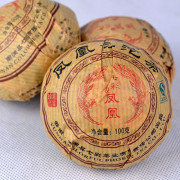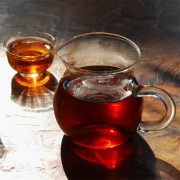Description
This Ripe Tuo Cha is made in Chinese province Yunnan. Compressed tea leaves traditionally forms a bowl. This new product of Menghai features pleasant soft taste with floral, grassy notes and light earthy aftertaste.
About Pu-erh
Pu-erh tea is the most oxidized form of tea, often aged. These teas are highly valued in China where the ways of producing have been kept a secret for centuries. Pu-erh’s specific flavor is the result of special processing method when after the leaves are picked, they are converted into a sundried base tea called Maocha and then fermented. After that, the leaves are aged and then packed into bricks or cakes. Unlike other teas, which get hard over time, Pu-erh can ripe and get better with age.
Pu-erh can be classified in two main categories:
- Raw Pu-erh (Pu-erh Sheng or Non-Fermented Tea)
This is a tea that does not go through the piling process, being harvested and stored naturally. It has a fresh smell, comparing with fermented tea, can be bitter, but generally has a sweet aftertaste. - Ripe Pu-erh (Pu-erh Shu or Fermented Tea)
This tea goes through a piling process which gives it a distinctive, mild flavor. Being a more mellow tea it has earthy smell with thick flavor. Because of the fermentation process, the leaves have reddish-brown color.
Pu-erh Tea provides many health benefits:
- Pu erh has anti-inflammatory properties, help to relieve arthritis, asthma and arteriosclerosis;
- help lower cholesterol and protective against heart disease and cancer;
- lowering blood sugar and preventing oxidation of cholesterol plaque;
- the antioxidant actions of Pu-erh may also make it useful in treating tumors;
- aids in weight loss;
- improves blood circulation;
- soothes and helps prevent stress.
Brewing Guide:
First the tea should be rinsed. Put the tea into the teapot and pour boiling water, it doesn’t need too much water this time, just cover the tea leaves. The rinse step can help washing and waking up your tea leaves. The rinsing time should be only 2 to 3 seconds. Ripe Pu-erh Tea usually needs to be rinsed two times because it has a piling process. Raw Pu-erh Tea only to be rinsed one time.
After that, you can discard the water which is not for drink. Then add boiling water (6 oz of water for 3 grams of tea) wait about 10-20 seconds and serve. The same leaves can be re-steeped for 5-8 times, adding 15-30 seconds to each steeping time. When Pu-erh is steeped a long time it can become as full-bodied and dark as coffee, but it never turns bitter, acidic or astringent. It just gets stronger, thicker, fuller and sometimes sweeter.















